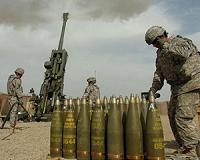| . |  |
. |
London (UPI) Mar 14, 2011 Two British spy planes planned to have been retired this month will be kept in service for at least three additional months. The BBC suggested in a report that the decision was linked to discussion on setting up a no-fly zone over Libya. It said the British Ministry of Defense declined to comment. The Nimrod R1s are sophisticated spy planes equipped with electronic devices and radar, currently deployed in the Middle East. They could play a key role in policing a no-fly zone, experts have said. The planes have been planned to be replaced by U.S. Rivet Joint spy planes but not until 2014. A fleet of nine Nimrod reconnaissance aircraft used by the British navy were taken out of service in January to save more than $2 billion over 10 years. The two planes used by the British air force were due to have been officially retired at a ceremony March 31 at the Waddington Air Base in Lincolnshire. At least 50 flight sergeants, 40 warrant officers, a large percentage of flight engineers and some sergeants, amounting to around 50 percent of the Nimrod personnel were ordered to be made redundant earlier this year. The air force was the first of the three armed services to release the details of its redundancy program with the army. The navy is expected to follow suit next month. This follows the announcements made in October in the Strategic Defense and Security Review, in which where the Ministry of Defense said it would be reducing the number of military personnel by 17,000 across all three services. Crews, however, at the Waddington base were recently told that won't happen and that the planes will continue to remain in service until the end of June at least. The BBC said it was told by the Ministry of Defense that it was "assessing if it might extend the life of what defense experts say are crucial assets." The United Kingdom and France are trying to finalize a U.N. resolution enforcing a no-fly zone over Libya. The United States, though has cautioned that the decision should have wide international support. The British air force also has an airborne warning and control system plane based in Malta, equipped with a long-range radar that can detect aircraft over a distance of hundreds of miles. The navy has drawn up contingency plans to mount a radar picket off the Libyan coast. The government has been criticized for its decision on the spy planes. The BBC quoted Shadow Defense Secretary Jim Murphy saying that he had "been urging the government to stop and think again. "They should now go the whole way and reopen their rushed defense review."
Share This Article With Planet Earth
Related Links The latest in Military Technology for the 21st century at SpaceWar.com
 Excalibur: Turning 'Artillery Cannon Into A Sniper Rifle'
Excalibur: Turning 'Artillery Cannon Into A Sniper Rifle'Picatinny Arsenal NJ (SPX) Mar 11, 2011 A lot can happen during the course of a phone call. On Jan. 14, 2005, Tom Coradeschi placed a phone call to Robert Pinto, triggering a conversation that would give impetus to a revolutionary advancement in artillery. Coradeschi had never met nor spoken with Pinto. But Coradeschi's boss, then Lt. Col. William Cole, had worked with Pinto before and suggested that Coradeschi call him. Carades ... read more |
|
| The content herein, unless otherwise known to be public domain, are Copyright 1995-2010 - SpaceDaily. AFP and UPI Wire Stories are copyright Agence France-Presse and United Press International. ESA Portal Reports are copyright European Space Agency. All NASA sourced material is public domain. Additional copyrights may apply in whole or part to other bona fide parties. Advertising does not imply endorsement,agreement or approval of any opinions, statements or information provided by SpaceDaily on any Web page published or hosted by SpaceDaily. Privacy Statement |